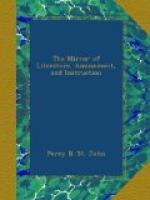With regard to the statement of the Druids being “ever foremost in the battle strife,” as your Correspondent has quoted Caesar, I am surprised that he has overlooked this passage: “The Druids were exempt from all military payment, and excused from serving in the wars;” indeed, one of the main objects of Bardism was to maintain peace, and the use of arms was therefore prohibited to its members; though in later times it was one of the duties of the king’s domestic bard, on the day of battle, to sing in front of the army the national song of “Unbennaeth Prydain” (the Monarchy of Britain,) for the purpose of animating the soldiers.
It is not possible that a people possessing the three orders of Druid, Bard, and Ovate, who, (leaving their poetry out of the question for the present,) were able to raise the immense piles of Abury and Stonehenge, could be the barbarians they are thought to be; and those who could raise such immense blocks of stone deserve at least credit for ingenuity. Now, it does not appear to me to require a great stretch of fancy to believe that the requisite knowledge was obtained of the architects of the Pyramids, Temples, and cities of Egypt and the east: and this is not improbable; as, according to the Triads, the Cymmry (or Welsh) came from the Gwlad yr Haf,[6] (the summer country) the present Taurida; and further, Herodotus says, that a nation called Cimmerians, (very much like their own name,) dwelt in that part of Europe and the neighbouring parts of Asia. Other historians are of similar opinion, and considering the numerous emigrations from Egypt, caused by religious persecutions and conquests, it is very likely that some of their priests or learned men were among those exiles, and that they communicated their knowledge to the same description of persons belonging to the nations with whom they sojourned. The founders of Athens and Thebes were exiles; and the Philistines, noted for their constant wars with the Jews, were originally expelled from Egypt. I have been informed that there has been found in the southern part of the United States, the remains of a building similar in its appearance to Stonehenge. Did a remnant of those Druids or Priests erect this and the Temples of Mexico, and leave behind them those implements of war and industry that have been found in the soil and in the mines of America? and to equal the manufacture of which, all the resources of modern art have proved inadequate. It appears that there existed at a most remote period, a sort of Freemasonry of priests, bards, and architects, who, and their




